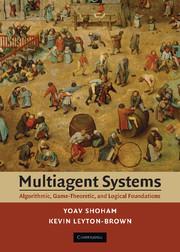Book contents
- Frontmatter
- Contents
- Credits and Acknowledgments
- Introduction
- 1 Distributed Constraint Satisfaction
- 2 Distributed Optimization
- 3 Introduction to Noncooperative Game Theory: Games in Normal Form
- 4 Computing Solution Concepts of Normal-Form Games
- 5 Games with Sequential Actions: Reasoning and Computing with the Extensive Form
- 6 Richer Representations: Beyond the Normal and Extensive Forms
- 7 Learning and Teaching
- 8 Communication
- 9 Aggregating Preferences: Social Choice
- 10 Protocols for Strategic Agents: Mechanism Design
- 11 Protocols for Multiagent Resource Allocation: Auctions
- 12 Teams of Selfish Agents: An Introduction to Coalitional Game Theory
- 13 Logics of Knowledge and Belief
- 14 Beyond Belief: Probability, Dynamics, and Intention
- Appendices: Technical Background
- Bibliography
- Index
13 - Logics of Knowledge and Belief
Published online by Cambridge University Press: 05 June 2012
- Frontmatter
- Contents
- Credits and Acknowledgments
- Introduction
- 1 Distributed Constraint Satisfaction
- 2 Distributed Optimization
- 3 Introduction to Noncooperative Game Theory: Games in Normal Form
- 4 Computing Solution Concepts of Normal-Form Games
- 5 Games with Sequential Actions: Reasoning and Computing with the Extensive Form
- 6 Richer Representations: Beyond the Normal and Extensive Forms
- 7 Learning and Teaching
- 8 Communication
- 9 Aggregating Preferences: Social Choice
- 10 Protocols for Strategic Agents: Mechanism Design
- 11 Protocols for Multiagent Resource Allocation: Auctions
- 12 Teams of Selfish Agents: An Introduction to Coalitional Game Theory
- 13 Logics of Knowledge and Belief
- 14 Beyond Belief: Probability, Dynamics, and Intention
- Appendices: Technical Background
- Bibliography
- Index
Summary
In this chapter we look at how one might represent statements such as “John knows that it is raining,” “John believes that it will rain tomorrow,” “Mary knows that John believes that it will rain tomorrow” and “It is common knowledge between Mary and John that it is raining.”
The partition model of knowledge
Consider a distributed system, in which multiple processors autonomously performing some joint computation. Of course, the joint nature of the computation means that the processors need to communicate with one another. One set of problems comes about when the communication is error prone. In this case the system analyst may find himself saying something like the following: “Processor A sent the message to processor B. The message may not arrive, and processor A knows this. Furthermore, this is common knowledge, so processor A knows that processor B knows that it (A) knows that if a message was sent it may not arrive.” The topic of this chapter is how to make such reasoning precise.
Muddy children and warring generals
Often the modeling is done in the context of some stylized problem, with an associated entertaining story. Thus, for example, when we return to the distributed computing application in Section 13.4, rather than speak about computer processors, we will tell the story of two generals who attempt to coordinate among themselves to gang up on a third.
Information
- Type
- Chapter
- Information
- Multiagent SystemsAlgorithmic, Game-Theoretic, and Logical Foundations, pp. 393 - 420Publisher: Cambridge University PressPrint publication year: 2008
Accessibility standard: Unknown
Why this information is here
This section outlines the accessibility features of this content - including support for screen readers, full keyboard navigation and high-contrast display options. This may not be relevant for you.Accessibility Information
- 1
- Cited by
